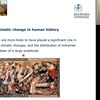1830
Swedish Economic Growth and Education Since 1800
2008. Canadian Journal of Economics 41(1), February, 166-185.

Selling pictures. Pictorial Economy and Commoditization 1820–2020
This project will place the current discussions concerning AI-generated images in a historical context, comparing it to two previous technological breakthroughs that have affected the use of pictures for commercial purposes.
Long-run income and wealth inequality, and the potential impact on inheritance flows
Jesper Roine, Associate Professor at Stockholm Institute of Transition Economics I will present what we know about long run income and wealth distribution across countries and also connect these findin
Religion and mental health in young adulthood: a register-based study on differences by religious affiliation in sickness absence due to mental disorders in Finlan
Epidemiology & Community Health vol. 78, issue 6 Abstract BackgroundReligiosity and spirituality are known to be positively correlated with health. This is the first study to analyse the interrelatio
Conference: Philosophical Perspectives on Social Injustice
Location: Institute for Futures Studies, Holländargatan 13 in Stockholm If you plan to attend all or parts of the conference, please register by sending an e-mail to [email protected] Thursday Decem
Framtider: Katharina Berndt Rasmussen och Karim Jebari
Kan vi vara optimistiska om världens och mänsklighetens framtid? Det är sällan bilden varit så motstridig som nu. I den här seminarieserien tillsammans med Tensta Konsthall diskuteras några teman som Katharina Berndt Rasmussen och Karim Jebari

Klaus Georg Hansen: Greenland – 300 years of colonisation
Since the formal colonisation of Greenland in 1721 by the Norwegian-Danish missionary Hans Egede Greenland has experienced five 'constitutional' breaks. Thus, seven distinct colonial eras can be ident

Anna Näslund
I am professor of Art History at Stockholm University and researcher at the Institute for Futures Studies. My research focuses on visual culture, picture theory and digitization. The project Selling Pic traces the genealogy of contemporary AI-generated image hype over 200 years of promoting technologies for the production, reproduction, and circulation of pictures on a mass scale. It aims to understand the historical role of pictures not merely as commodities but as agents of commerce. The project focuses on emerging picture techniques in the 1820s, 1920s, and 2020s, examining iconographic and discursive patterns in pictures of mass reproduction (metapictures) and comparing vernacular picture theories—expressed in advertising copy and trade journalism—with canonical picture theories. Rooted in historical material practices, the project seeks to clarify and expand our understanding of how and why pictures play a central role in the work of selling in modern and contemporary societies.

Fredrik Charpentier Ljungqvist: Impacts of past climate variability – lessons for the 21st century
The talk summarizes key findings of state-of-the-art research on how climate variability and change have affected different aspects of human history in medieval and early modern Europe (c. 700–1815 CE
Klaus Georg Hansen: Greenland – 300 years of colonisation
Venue: Institute for Futures Studies, Holländargatan 13 in Stockholm or online Research seminar with Klaus Georg Hansen, PhD in Colonial History and modern society of Greenland. He is an independent fil








